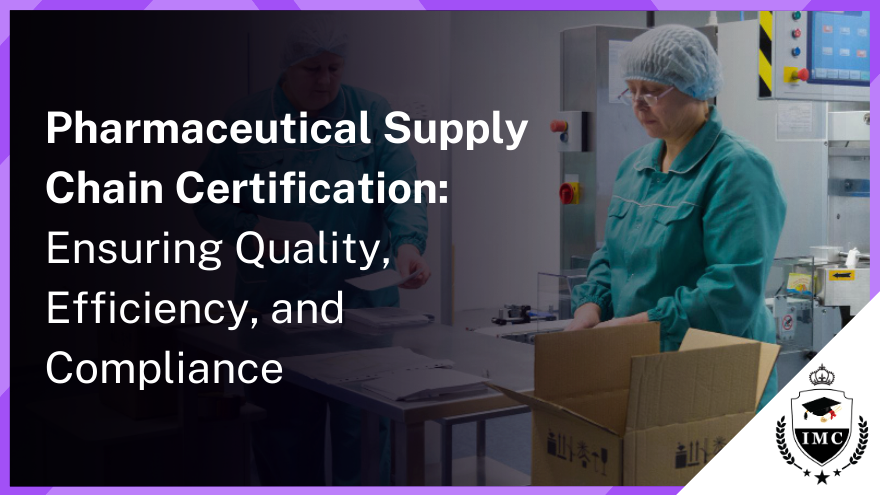The pharmaceutical industry faces unique challenges and opportunities in optimizing its supply chain. From managing complex regulatory compliance requirements to ensuring the quality and integrity of products, pharmaceutical companies must navigate an intricate landscape of stakeholders, regulations, and processes. To excel in this environment, professionals in the pharmaceutical industry can benefit from specialized supply chain management certification. This article explores the value of supply chain management certification for the pharmaceutical industry, discussing the key benefits, essential skills and knowledge, and career opportunities for certified professionals.
Benefits of Supply chain management certification for the Pharmaceutical Industry:
Enhanced Compliance and Risk Management:
A Supply chain management certification equips professionals with a comprehensive understanding of regulatory requirements, quality standards, and best practices governing the pharmaceutical industry. This knowledge enables them to implement effective strategies for compliance, risk mitigation, and proactive quality management, reducing the likelihood of supply chain disruptions and reputational damage.
Operational Efficiency and Cost Optimization:
Certified professionals can optimizeSupply chain processes by leveraging their expertise in inventory management, logistics, and distribution. They can identify and eliminate inefficiencies, streamline operations, and negotiate favorable terms with suppliers, leading to improved cost control and operational efficiency.
Improved Quality and Patient Safety:
A robust supply chain is crucial for ensuring the quality and safety of pharmaceutical products. With specialized knowledge in quality management systems, certified professionals can establish and enforce rigorous quality control procedures throughout the supply chain, minimizing the risk of product defects and ensuring patient safety.
Strengthened Collaboration and Communication:
Supply chain management certification fosters collaboration and effective communication among various stakeholders within the pharmaceutical industry, including manufacturers, distributors, and regulatory bodies. Certified professionals can effectively manage supplier relationships, facilitate information sharing, and coordinate activities across different functions, promoting seamless supply chain operations.
Career Advancement and Recognition:
Obtaining a supply chain management certification demonstrates a commitment to professional development and expertise. It sets certified professionals apart, enhancing their employability and promoting career advancement opportunities. The certification serves as a valuable credential, recognized by employers and industry peers, indicating a high level of competence and knowledge in pharmaceutical supply chain management.
Essential Skills and Knowledge for Supply Chain Management Professionals in the Pharmaceutical Industry:
Regulatory Compliance and Quality Standards:
A thorough understanding of regulatory compliance requirements, such as Good Manufacturing Practices (GMP) and Good Distribution Practices (GDP), is essential for ensuring adherence to quality and safety standards.
Risk Management and Mitigation:
The ability to identify, assess, and mitigate supply chain risks is crucial to prevent disruptions and safeguard the integrity of pharmaceutical products.
Inventory Management and Logistics:
Expertise in inventory management, forecasting, and logistics enables professionals to optimize stock levels, reduce lead times, and ensure timely product delivery.
Supplier Management and Procurement:
Strong negotiation skills and the ability to evaluate and select reliable suppliers are vital for securing favorable terms, managing vendor relationships, and ensuring the quality of procured materials.
Quality Control and Assurance:
Knowledge of quality control and assurance methodologies is essential for implementing effective measures to prevent defects, monitor product quality, and ensure compliance with regulatory standards.
Data Analysis and Forecasting:
The ability to analyze supply chain data, identify trends, and make informed forecasts helps professionals anticipate market demands, optimize production schedules, and prevent stock-outs.
Career Opportunities for Professionals with Supply chain management certification in the Pharmaceutical Industry:
Supply Chain Manager:
Certified professionals can assume leadership roles as Supply Chain Managers, overseeing the planning, coordination, and execution of supply chain activities, ensuring the smooth flow of products and services.
Logistics Manager:
Professionals with expertise in logistics can excel as Logistics Managers, responsible for managing transportation, warehousing, and distribution operations, ensuring timely and cost-effective delivery of products.
Quality Assurance Manager:
Individuals with a strong background in quality assurance can pursue roles as Quality Assurance Managers, responsible for developing and implementing quality control systems, conducting audits, and ensuring adherence to regulatory requirements.
Procurement Manager:
Certified professionals can thrive as Procurement Managers, responsible for sourcing raw materials, negotiating contracts, and managing supplier relationships, securing favorable terms and ensuring the quality of procured materials.
Supply Chain Consultant:
With specialized knowledge and expertise, certified professionals can provide consulting services to pharmaceutical companies, helping them optimize their Supply chains, improve compliance, and achieve operational excellence.
Regulatory Affairs Specialist:
Professionals with a deep understanding of regulatory requirements can pursue careers as Regulatory Affairs Specialists, ensuring compliance with industry regulations, managing regulatory submissions, and liaising with regulatory agencies.
Summary:
In conclusion, supply chain management certification is an invaluable asset for professionals working in the pharmaceutical industry. By acquiring specialized knowledge and skills, certified professionals can optimize Supply chain operations, ensure compliance, improve quality, and drive operational performance. The certification enhances career prospects, opens up new opportunities for leadership roles, and demonstrates a commitment to professional excellence in the pharmaceutical industry. Enroll Now at IMC Institute and become a part of a network of supply chain professionals dedicated to driving innovation and excellence. Visit our website or contact our admissions team today to learn more about our programs and how they can benefit your career.






